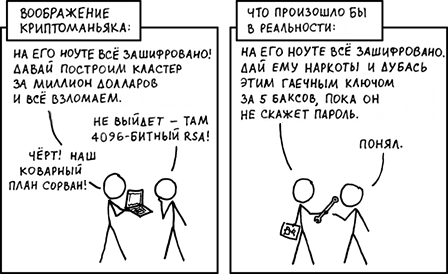Answer the question
In order to leave comments, you need to log in
How many bits of a password is considered complex enough not to be broken by CIA/FSB brute force?
I'll start with a quote from the answer:
When talking about the length of the key in N bits, they usually mean that the key can have 2**N different values. Accordingly, in your case, for a phrase of 100 different words with a length of 10 words, we have 100 ** 10 options. To express this in bits, you need to take the binary logarithm from it.
You get log2 100**10 ≈ 67 bits.
Answer the question
In order to leave comments, you need to log in
67 bits is not enough.
100-128 bits is enough for the current computing power.
256 bits, which are used in most modern cryptosystems, are overkill by a huge margin.
But you need to understand that this is all a theory, where there is an ideal error-free implementation of the cryptoalgorithm and a truly unique, unknown key is used.
It should also be taken into account that the algorithm itself can be vulnerable to quantum algorithms. Humans don't yet have quantum computers capable of hacking RSA, for example, but they may be in the future. Asymmetric algorithms are more vulnerable, symmetric ones will be quite stable even after the quantum revolution.
A once hacked database of some online store makes ALL passwords that were used by its users vulnerable, even if they are good passwords, because at first they will not use brute force, but a dictionary attack, which will already contain these passwords.
The idiot user is a classic attack vector. Social engineering, keyloggers, malware are quite working tools.
Well, and most importantly - a universal hacking method - thermorectal cryptanalysis, which has almost 100% efficiency.
The FSB will act exactly as shown in the picture from XKCD:

Googled this:
To ensure cryptographic strength for the needs of the Federal Government today requires at least 112 bits (for example, to encrypt or sign data).
To get 128 bits of entropy using uppercase and lowercase letters, as well as numbers, you need a password 22 characters long ((5.95 * 22 = 131 bits).
How many bits must be in the password so that it is guaranteed not to be broken ... by any intelligence agencies in the world?
Didn't find what you were looking for?
Ask your questionAsk a Question
731 491 924 answers to any question